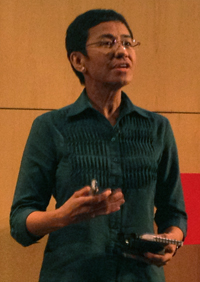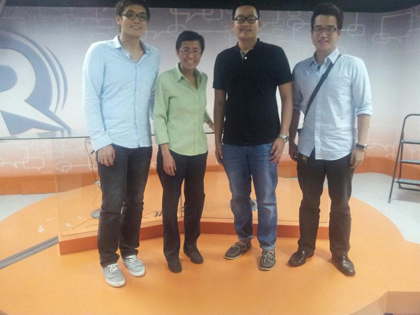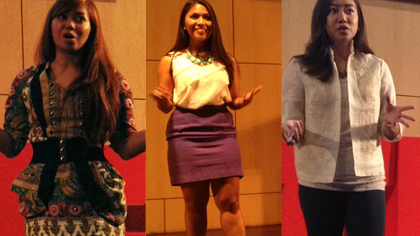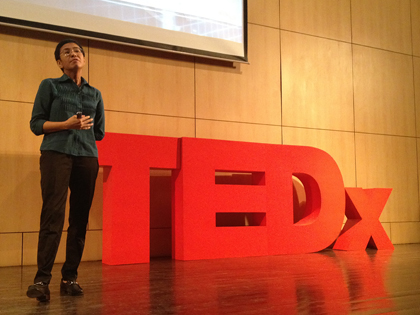SUMMARY
This is AI generated summarization, which may have errors. For context, always refer to the full article.

I could hear the laughter before I opened the door. I wasn’t prepared for what I saw when I pulled the black curtains aside at the back of the auditorium. Ateneo’s Leong Hall was packed. 23-year-old Arriane Serafico, one of the founders of Postura Project, was in the middle of the stage, telling the audience about her search and how she decided to jump – literally and metaphorically.
The mood was electric. People were leaning forward. Excitement moved through each person, spreading throughout a crowd of hundreds. It was standing-room only. People were sitting on the stairs, standing on the aisles.
What struck me was their level of engagement. It’s been a long time since I felt such a strong wave of enthusiasm and inspiration coursing through so many people. No skepticism. Definitely no cynicism. They weren’t judging. I could feel it in the room. They were right there with the speaker listening with open minds and open hearts. That’s when it hit me. They were actively exploring, hunting for something better.
It’s not led by people carrying placards, shouting in the streets. It’s not a build-up of anger against anyone or anything. It is this – a search for ideas, for new ways of doing things, a new lens to view the world, a new solution for old problems.
Here’s the best part: it’s led by the 20-somethings, frustrated by old structures and conscious of the power technology now gives them. It’s a generation that’s connected – not just to each other but to a global community. They know there’s something more, and they are holding their elders to a better standard.
These thoughts rushed through my head, adrenalin racing through my body as I tried to understand how this energy was created in this auditorium. I’ve given many speeches the past few years, but this audience was special. If you were there, you know what I’m talking about. For those who weren’t, this just may be the crucible that forges a new Philippines of infinite possibilities.
I remembered how the organizers, 3 young men, came to the office late one night with coffee and ensaymadas and spoke of a revolution.

Francis Tan, Earl Javier and Christopher Ang were planning TEDxKatipunan and were looking for ideas to spark a revolution. All 24 years old and college friends, they joked they stood for TED. Francis works for Globe and was the T for technology; Earl works with McCann and was E for entertainment; and, Chris is a brand manager for Unilab – the D for design.
They knew what they wanted, and they scoured their world for speakers who represented their vision. Now I felt lucky they included me.
Design maven Arriane Serafico told the audience to jump, and they did. She asked them to do something that would never have worked for a different audience: raise their fists and pledge to do their best. No one in the room thought it was corny, and even better, everyone did it.
Because of my crazy schedule, I had missed Dylan Wilks, the CEO of Human Nature – a foreigner telling Filipinos how to best be Filipino. The crowd embraced him. Arriane was the second speaker. She was followed by photographer John Chua, who talked about something I thought was missing when I first returned to the Philippines in 1986. Over the years, it grew – a spirit of volunteerism and civic duty. John showed what volunteers can do for special kids and the Banaue rice terraces.

I was blown away by these young women in their 20s. Anna Oposa is 24 years old, and she was the most polished speaker in the room. Her cause: “to stop global whining” and conservation – Save Philippine Seas, but she brought it to life for all of us because she intertwined it with hers. She was witty, biting at times, but hitting just the right cadence and tone. This is a young lady to watch.
Pie Alvarez is the Philippines’ youngest mayor at 25 – with a candor so refreshing it made everyone in the room laugh, making even the most cynical begin to think that maybe, just maybe, new blood in politics can change our nation. Maybe, just maybe, we can expose the rhetoric and backroom deals because if they’re young and idealistic, perhaps those deals won’t be done at all. Pie said it directly: it’s time for the older folks to move aside.

I spoke after the two of them, and only then did I realize I was closing this amazing gathering. I said the first thing I just realized: I was a journalist before either Anna or Pie had even been born!
I have long thought about what we need to do to move our country. It’s about changing our values, leaving behind our feudal past, empowering our people – which is exactly what these young women urged the audience to do. Through the years, I decided the core problem is corruption, and I had a theory I have spent my life testing for how to fight it – one that demands individual action and commitment. I’ve proven it works – at least in the organizations I managed.
I worried that I would be a downer for the group. Not many were laughing while I was speaking. I wasn’t as entertaining as the speakers before me. Because the audience was so open, I was more vulnerable. I was tired, and the memories came flooding back. At one point, I had to pull back from tears. I got lost. I watched them watching me, and all I could think of were the wasted opportunities. So I told them about problems which have long resisted change.
I told them what I did and called for action on their part. This supportive audience listened, and I believe many will act.
This is the future: older folks – those with experience – have to know when to step aside and take a cue from the youth. We can teach them what we’ve learned. We can share how we made decisions. That’s what veterans do – mitigate the enthusiasm of youth and caution against mistakes. We provide perspective. But there is something different about this generation and this time. The parochial boundaries which insulated us are gone, blown to smithereens by the Internet and social media.
This is a magical, unique time. The interface between generations now is different because perhaps for the first time ever, those who have experience can be overtaken by those who don’t — because today’s digital natives have experience their elders don’t have and that is balancing the scale.
I knew it instinctively when we were putting Rappler together. Those of us in our 40s had enough experience to know the realities first-hand, but we’re still young enough to be idealistic – to know it can be better. Rappler’s board is the generation in the middle – those like me who have worked with multinationals or have set up their own companies. We provide the guiding force, but we know that the new world belongs to the digital natives.
They form the bulk of our team: the majority of our people are in their 20’s and early 30’s. They’re idealistic. They learn fast. They adapt. They’re not saddled with legacy workflows or conventions. Oh yeah, and they don’t sleep.
If TEDxKatipunan is an indication of what the 20-somethings can do left on their own, I want to see more.
I am excited about this revolution. Take it away, guys. Do something better. I want to see meaningful change come to the Philippines in my lifetime! – Rappler.com
Add a comment
How does this make you feel?
There are no comments yet. Add your comment to start the conversation.